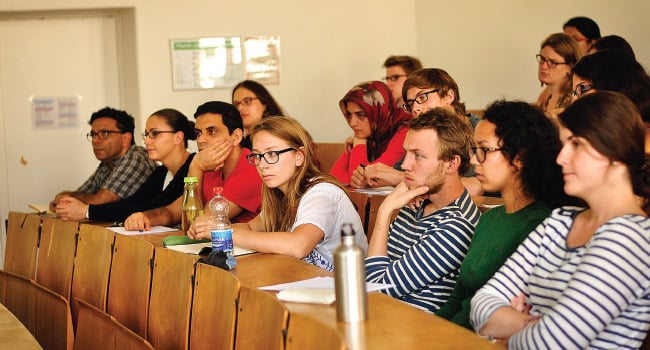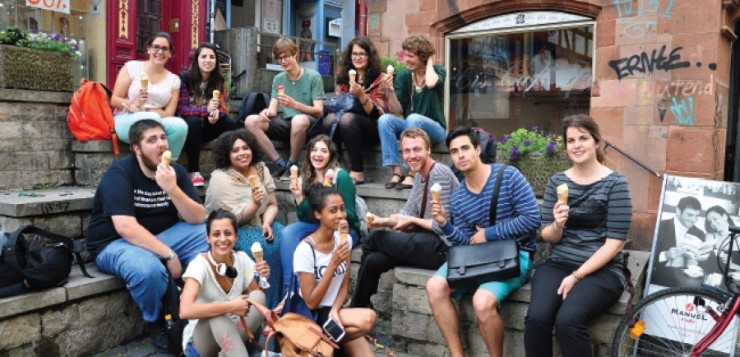“We got to see things from other angles.” Canadian students at the Hessen International Summer University in Marburg, Germany
Canada and the German state of Hessen have a long history of academic partnerships. Still, would you know where to point if you were looking for Hessen on a map? The state is situated right in the heart of Germany and is home to some of the country’s leading universities and research institutes, all of which are within easy reach of Frankfurt am Main, Germany’s financial and logistic hub.
Hessen has thirteen state institutions of higher education, which provide excellent Bachelor’s, Master’s and Doctorate degrees in all major disciplines of study and research.
One of the oldest and most traditional higher education institutions is situated in the town of Marburg, one hour north of Frankfurt. Marburg is a university town rich in tradition – medieval, romantic, safe, and vivacious, all at the same time. Founded in 1527, Philipps-Universität Marburg has been a place of research and teaching in all disciplines (except engineering) for nearly five centuries. Since that time, the university has been welcoming international students and scholars from all over the world.
Philipps-Universität Marburg, as well as several other Hessen Universities, has been engaging in close partnerships with Canadian universities for decades. Canadian students are being offered a variety of study opportunities: degree-seeking, exchange/short term, or summer program. There is an option for everyone.
For a semester or year-long stay, students with a good knowledge of the German language can join the regular degree classes. There is an excellent orientation program in place, so no one will feel lost in the new environment.
Students with little or no knowledge of German will find a safe haven in the International Undergraduate Study Program (IUSP) at Philipps-Universität Marburg, a programme that is adapted to North American academic calendars. Besides a broad variety of classes held in English, there is help in any aspect of the student’s stay at Marburg.
Another jewel in the crown of Philipps-Universität is the renowned four-week Hessen International Summer University in the field of International Relations. As a state-wide program, the Hessen International Summer Universities (Hessen:ISUs) take place in different cities of Hessen every summer between June and August. Each ISU offers a different academic focus (Social Sciences, Economics, European Studies, Engineering, Culture, and Law), and provides students with a good first impression of Hessen’s educational offerings. Besides a four-week study program in English and/or German and German language courses at different levels (including beginners), the Hessen:ISUs offer weekend excursions and a diverse cultural program. Upon successful completion, students can earn up to nine ECTS-Credits that can be transferred to their home university.
At Philipps-Universität Marburg, the 16th ISU has just ended on August 15th. It was devised by the University’s International Office in collaboration with the Center for Peace and Conflict Studies and the Center for Near and Middle Eastern Studies. Students and teachers from 16 different nations discussed and learned about the ISU’s main topic, ‘’Europe and the Middle East in Transition.”
The summer program is dedicated not only to enhancing academic achievement, but also to promoting a strong social network among international students. The whole program is framed by intensive German language classes at five levels (including beginners), several supplement courses, a weekly film show connected to the overall theme, as well as weekend excursions and visits to Marburg’s religious and municipal institutions.

The 2014 academic program was comprised of three modules: Business/Economics, Politics/International Relations, and EU-Germany-Middle East. This attracted a multitude of international students seeking degrees not only within, but also outside of the Social Sciences. Each module contained seminars that were directly related to the program and led by experienced and accredited professors. Likewise, weeklong introductory courses were offered in Arabic, Hebrew, and Turkish, to provide an insight into the language background of the topics discussed in the seminars. The ISU program gives students the opportunity to complement their studies at home, or enhance their knowledge in topics either not available at their home institutions, or not directly in relation to their course of study.
Although the academic program is primarily offered in English, there are courses available in German for native or advanced German speakers. However, no prior knowledge of German is needed to attend the Hessen:ISUs.
Among this year’s team of professors was James Devine of Mount Allison University. James, this his first time in Marburg, taught a seminar on “Iran and the Middle East.” Asked for a short reflection on his time in Marburg this summer, James says:
“I believe the ISU program provides students with an excellent opportunity to learn about the Middle East, particularly those who come from schools that do not have a dedicated Middle East Studies Program. Rather than taking a few Middle East-related classes over the course of their undergraduate degree, ISU students are exposed to a coherent and well-rounded curriculum that includes history, politics, political-economy, culture and languages. In a remarkably short period of time, students are given a solid foundation in the area that will help them as they go forward with their studies. Just as importantly, students are also able to learn from each other.”
Because the seminars are interdisciplinary and cover subjects such as International Relations, History, Economics and Culture, the program attracts many international students with different aspirations and perspectives. This year, several students from Canada were among the participants. Marzieh Eskandari, an ISU participant from Iran who currently studies at the University of Saskatchewan, noted that the diversity inside the classroom is perhaps the best benefit of the ISU program. In an interview, Marzieh explains, “The unique aspect of the school was that you have people in the program from the region which we are studying.” For this reason, the Marburg ISU is pleased with international students with diverse backgrounds and, possibly, firsthand knowledge on the topics discussed in the seminars which can better promote cultural exchange in an academic setting.
Within the group of forty students, 8 primary languages were spoken: Arabic, English, French, German, Hebrew, Russian, Spanish, and Ukrainian. By participating in the ISU, students had a great chance to personally get to know local and other international students from different cultural and religious backgrounds.
In her testimonial, Grace O’Hara, a student from Mount Allison University, recalls her first week in Marburg. “One of our first days, we had a picnic. It was interesting to see that these [ISU participants] were all perfect strangers. But, because we were brought together, friendships quickly formed.”
The program at Marburg continues to prove each year that strong connections and friendships can be fostered through great diversity. As stated by Grace, “It is just amazing that when we talk, although we come from very different places, we realize how similar we are and how many things we have in common.”
When asked if she could imagine a broader impact that the ISU program could have on her life, Marie-Raphaëlle Le Blond, a student from Université Laval in Québec, states, “We are coming back home with a new background, with the experiences we shared with all the people. We got to see things from other angles. This is always very good, especially when we are talking about conflicts. We have people coming from all sides.”
With that being said, the cultural experience gained from the participants of ISU is indeed unique and forms a social network for the future. Marie-Raphaëlle goes further to say, “The next time I hear news about the Emirates or about Mexico, I will say ‘oh I have friends there,’ and I will feel concerned. We [participants]feel concerned about the world just because we feel connected. So, I think the program raises our awareness.”
Furthermore, as demonstrated by these testimonials from only a few participants studying in Canada, ISU Marburg – as well as all Hessen:ISUs – are a tremendous opportunity for international students to enhance their knowledge in the chosen subjects, form long-lasting relationships, and raise global awareness.
The students of this year’s ISU program at Marburg will certainly know where to point on the map if asked where Hessen was. Philipps-Universität Marburg and all Hessen Universities likewise are happy to invite the world to its cities and classrooms again next summer.
Contributed by:
Study in Hessen
Authors:
Cornelia Janus, Coordinator of the Hessen International Summer University (ISU), International Office, Philipps-Universität Marburg
Shaye Linder, Graduate with BA History from University of Tennessee at Chattanooga; USA, Former ISU 2012 Participant and 2014 Intern; MA History at Siegen University, Germany, in process.
www.isu-hessen.de
www.uni-marburg.de/isu
www.study-in-hessen.de
Photo courtesy of Hessen State Ministry of Higher Education, Research and the Arts








Discussion1 Comment
How can I get the application form in order to apply for your provision?